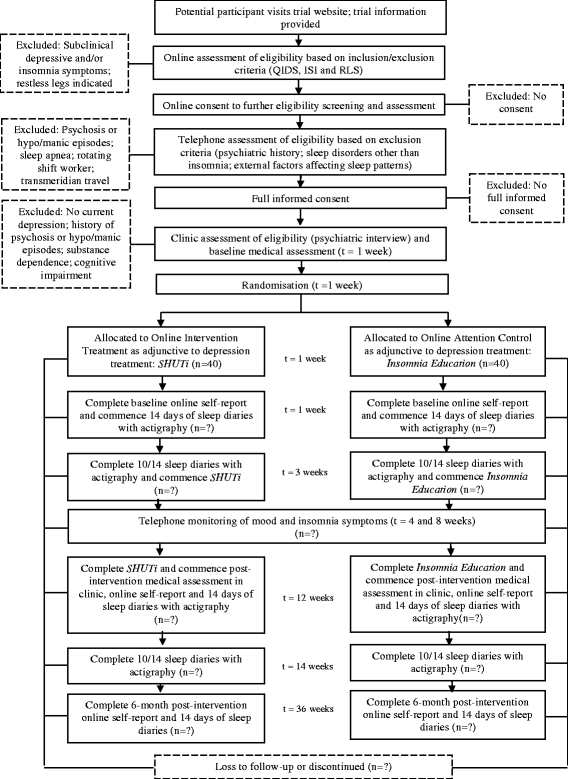The Sleep Or Mood Novel Adjunctive therapy (SOMNA) trial: a study protocol for a randomised controlled trial evaluating an internet-delivered cognitive behavioural therapy program for insomnia on outcomes of standard treatment for depression in men
- PMID: 25652579
- PMCID: PMC4321324
- DOI: 10.1186/s12888-015-0397-x
The Sleep Or Mood Novel Adjunctive therapy (SOMNA) trial: a study protocol for a randomised controlled trial evaluating an internet-delivered cognitive behavioural therapy program for insomnia on outcomes of standard treatment for depression in men
Abstract
Background: Insomnia is a significant risk factor for depression onset, can result in more disabling depressive illness, and is a common residual symptom following treatment cessation that can increase the risk of relapse. Internet-based cognitive behavioural therapy for insomnia has demonstrated efficacy and acceptability to men who are less likely than women to seek help in standard care. We aim to evaluate whether internet delivered cognitive behavioural therapy for insomnia as an adjunct to a standard depression therapeutic plan can lead to improved mood outcomes.
Methods/design: Male participants aged 50 years or more, meeting Diagnostic and Statistical Manual of Mental Disorders criteria for current Major Depressive Episode and/or Dysthymia and self-reported insomnia symptoms, will be screened to participate in a single-centre double-blind randomised controlled trial with two parallel groups involving adjunctive internet-delivered cognitive behavioural therapy for insomnia and an internet-based control program. The trial will consist of a nine-week insomnia intervention period with a six-month follow-up period. During the insomnia intervention period participants will have their depression management coordinated by a psychiatrist using standard guideline-based depression treatments. The study will be conducted in urban New South Wales, Australia, where 80 participants from primary and secondary care and direct from the local community will be recruited. The primary outcome is change in the severity of depressive symptoms from baseline to week 12.
Discussion: This study will provide evidence on whether a widely accessible, evidence-based, internet-delivered cognitive behavioural therapy for insomnia intervention can lead to greater improvements than standard treatment for depression alone, in a group who traditionally do not readily access psychotherapy. The study is designed to establish effect size, feasibility and processes associated with implementing e-health solutions alongside standard clinical care, to warrant undertaking a larger more definitive clinical trial.
Trial registration: Australian and New Zealand Clinical Trials Registry ACTRN12612000985886 .
References
-
- Stewart R, Besset A, Bebbington P, Brugha T, Lindesay J, Jenkins R, Singleton N, Meltzer H. Insomnia comorbidity and impact and hypnotic use by age group in a national survey population aged 16 to 74 years. Sleep. 2006;29(11):1391–1397. - PubMed
-
- Buysse DJ. Insomnia, depression and aging. Assessing sleep and mood interactions in older adults. Geriatrics. 2004;59(2):47–51. - PubMed
-
- Sunderajan P, Gaynes BN, Wisniewski SR, Miyahara S, Fava M, Akingbala F, DeVeaugh-Geiss J, Rush AJ, Trivedi MH. Insomnia in patients with depression: a STAR*D report. CNS Spectr. 2010;15(6):394–404. - PubMed
Publication types
MeSH terms
Associated data
LinkOut - more resources
Full Text Sources
Other Literature Sources
Medical


